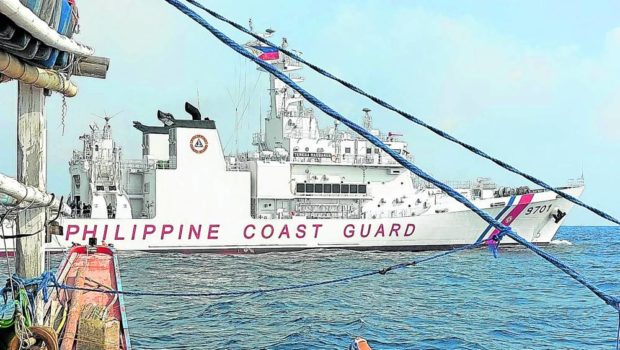
FILE PHOTO: The BRP Teresa Magbanua, the Philippine Coast Guard (PCG) Fleet’s largest vessel deployed at the Kalayaan Island Group. PHOTO FROM PCG
MANILA, Philippines — The Philippine Coast Guard (PCG) needs at least 20 offshore patrol vessels to sustain its presence in the West Philippine Sea and other territorial waters of the country, an official said Monday.
PCG spokesperson for West Philippine Sea Affairs Commodore Jay Tarriela said increasing the number of offshore patrol vessels is a “priority” for them.
“The Philippine Coast Guard is actually proposing at least more than 20 offshore patrol vessels,” he said during an ANC interview.
“We believe that those offshore patrol vessels will not just sustain our presence in the West Philippine Sea but it can also intensify our presence up north, for example in Bashi Channel and other eastern seaboard and also the Celebes Sea, Sibutu passage — all parts of the exclusive economic zone (EEZ) under our responsibility,” he continued.
Tarriela said the PCG currently has only three offshore patrol vessels — one of which was bought from France and two from Japan. He said these vessels are not enough to protect the Filipino fishermen in the West Philippine Sea.
READ: PCG to lawmakers: It’s time to modernize in wake of China harassment in WPS
The call for more offshore patrol vessels came about after recent maritime incidents between the PCG and the Chinese Coast Guard.
On February 6, a PCG vessel was attacked by the Chinese Coast Guard with a green laser in Ayungin Shoal in the West Philippine Sea, causing a “temporary blindness” of the Filipino crew.
READ: China harasses Philippine Coast Guard vessel with laser
The PCG also spotted at least 30 suspected Chinese maritime militia vessels in Sabina and Ayungin Shoal also in the West Philippine Sea during its maritime domain awareness flight last February 21.
READ: Coast Guard spots 30 suspected Chinese militia vessels in Sabina, Ayungin shoal
Apparently, China’s actions were anchored on its sweeping claims over South China Sea, including the West Philippine Sea.
But the July 2016 ruling of the United Nations-backed Permanent Court of Arbitration (PCA) based in The Hague, Netherland, invalidated China’s nine-dash line claim that covers almost the entire South China Sea.
The Philippines, under the administration of then President Benigno S. Aquino III, in 2013 challenged before the PCA Bejing’s assertion that it owns more than 80 percent of the South China Sea, which included waters in the exclusive exonomic zone (EEZ) of Brunei, Malaysia, the Philippines, and Vietnam.
The PCA ruled that China’s nine-dash line claim had no basis in international law and that it had violated the Philippines’ sovereign right to fish and explore resources in the West Philippine Sea, the waters within the country’s 370-kilometer EEZ in the South China Sea.